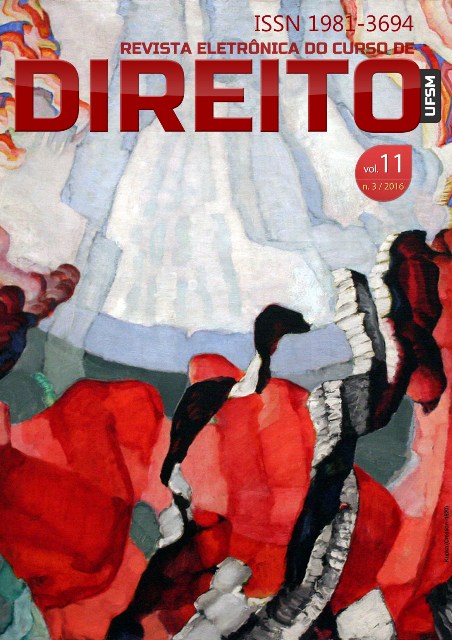MERCADO E IGUALDADE: NOTAS SOBRE O USO DO TERMO “MERCADO” E UMA CRÍTICA A DWORKIN
DOI:
https://doi.org/10.5902/1981369422398Parole chiave:
Dworkin, igualitarismo, mercado.Abstract
O artigo tem dois objetivos. Primeiro, procura discernir os sentidos com os quais o termo “mercado” é usado na literatura, ora como falta de impedimentos jurídicos à liberdade de contratar, ora como relações suscetíveis a variações de oferta e demanda, ora como falta de coordenação e ora, finalmente, como “lugar” de satisfação de preferências. O segundo objetivo é ilustrar como o descuido com essa variação de significados atrapalha argumentos normativos sobre o mercado. Trata-se, para tanto, do argumento de Dworkin sobre a imprescindibilidade do mercado para a igualdade de recursos. Afirma-se que esse argumento é problemático porque, embora dependa de o mercado ser tido como “lugar” para a satisfação de preferências, presume, em geral, que isso seja assegurado simplesmente pela falta de impedimentos jurídicos à liberdade de contratar.
Downloads
Riferimenti bibliografici
AXELROD, R. The evolution of cooperation. Nova York: Basic Books, 1985.
AYRES, I. Regulating opt-out: an economic analysis of altering rules. Yale Law Journal, nº. 121, 2012.
BEN-SHAHAR, O.; POTTOW, J. A. E. On the stickiness of default rules. Florida State University Law Review, nº 33, 2006.
BERNSTEIN, L. Social norms and default rules analysis. Southern California Interdisciplinary Law Journal, nº 3, 1993.
COHEN, G. A. On the currency of egalitarian justice. Ethics, nº 4, 1989.
DWORKIN, R. Taking rights seriously. Cambridge: Harvard University Press, 1977.
DWORKIN, R. Sovereign virtue: the theory and practice of equality. Cambridge: Harvard University Press, 2000.
ELSTER, J. Sour grapes: studies in the subversion of rationality. Cambridge: Cambridge University Press, 1983.
ELSTER, J. The market and the forum: three varieties of political theory. In: ELSTER, J.; HYLLAND, A. (coord.). Foundations of social choice theory. Cambridge: Cambridge University Press, 1986.
GRANOVETTER, M. Economic action and social structure: the problem of embeddedness. American Journal of Sociology, nº 91, 1985.
HALL, P. A.; SOSKICE, David. An introduction to varieties of capitalism. In: HALL, P. A.; SOSKICE, D. (coord.). Varieties of capitalism: the institutional foundations of comparative advantage. New York: Oxford University Press, 2001.
HUSSAIN, W. Nurturing the sense of justice: the Rawlsian argument for democratic corporatism. In: O’NEILL, M.; WILLIAMSON, T. (coord.). Property-owning democracy: Rawls and beyond. Malden: Blackwell, 2012.
JOHNSTON, J. S. Strategic bargaining and the economic theory of contract default rules. Yale Law Journal, nº 100, 1990.
KAHNEMAN, D.; KNETSCH, J. L.; THALER, R. (1986). Fairness as a constraint on profit seeking: entitlements in the market. American Economic Review, nº 76, 1986.
KLEIN, B.; CRAWFORD, R. G.; ARMEN, A. A. Vertical integration, appropriable rents, and the competitive contracting process. Journal of Law and Economics, nº 21, 1978.
KOROBKIN, R. The status quo bias and contract default rules. Cornell Law Review, nº 83, 1998.
LINDBECK, A.; SNOWER, D. J. Wage setting, unemployment, and insider-outsider relations. American Economic Review, nº 76, 1986.
MILLER, D. Market, state and community: theoretical foundations of market socialism. Oxford: Clarendon Press, 1989.
RABIN, M. Incorporating fairness into game theory and economics. American Economic Review, nº. 83, 1993.
SATZ, D. Why some things should not be for sale: the moral limits of markets. Oxford: Oxford University Press, 2010.
SEN, A. Maximization and the act of choice. Econometrica, nº 65, 1997.
SPIER, K. E. Incomplete contracts and signalling. RAND Journal of Economics, nº 23, 1992.
TOMASI, J. Free market fairness. Princeton: Princeton University Press, 2012.
WILLIAMSON, O. E. The mechanisms of governance. Nova York: Oxford University Press, 1996.Axelrod, R. (1985): “The evolution of cooperation”. Basic Books, New York.
##submission.downloads##
Pubblicato
Come citare
Fascicolo
Sezione
Licenza

Este obra está licenciado com uma Licença Creative Commons Atribuição-NãoComercial-SemDerivações 4.0 Internacional.








